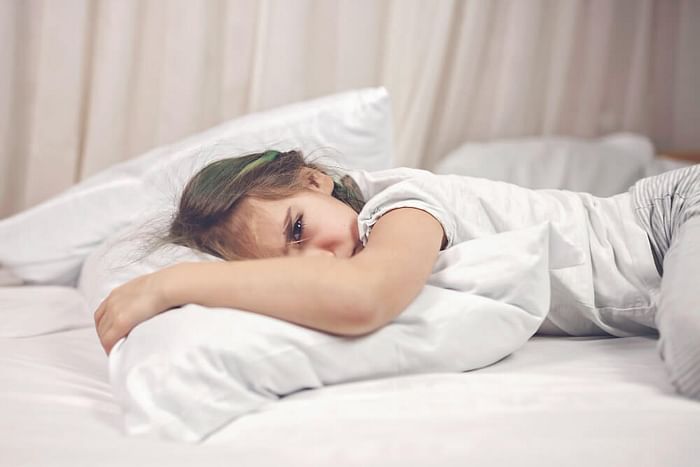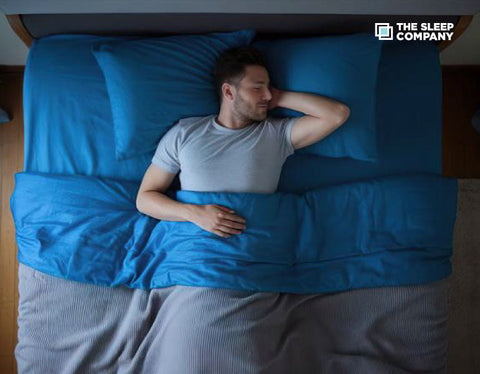My Cart

How Autism Effects Your Kids Sleep

Autism & Sleep: A Complete Guide for Parents

Autism is a complex disorder that affects both behavior and communication. It might encompass a wide range of symptoms. Autism might be a very minor issue or a handicap requiring full-time care in a specialized setting. Sleeping can be particularly challenging for children with autism. Knowing how to assist your autistic child with this problem can be challenging if you’re a parent.
In this article, we examine the causes of autistic children’s trouble falling asleep and offer solutions.
What Is Autism?
Autistic children struggle with communication. They find it difficult to comprehend the thoughts and emotions of others. They are unable to express themselves through gestures, facial expressions, touch, or speech. They could struggle with learning. Their skill growth could be uneven. For instance, someone might struggle with communication but excel at arithmetic, music, and painting. In recent years, more children than ever before have been diagnosed with autism.
Symptoms of Autism

Common symptoms of autism include:
- Missing out on eye contact.
- A limited range of interests or a strong passion for select subjects.
- High sensitivity to sensations that other people might find normal, such as sounds, touching, scents, or sights.
- Acting repeatedly, such as saying the same words or phrases, rocking back and forth, or pulling a lever
- Issues with verbal comprehension or employing gestures, facial expressions, or voice tone.
- Reluctance to be hugged or held.
- Not paying attention to or glancing at other persons.
- Avoid looking at objects while someone else points at them.
- Using a monotone, flat, or robotic voice when speaking.
- Difficulty adjusting to routine adjustments.
- Seizures can occur in some autistic kids.
Why Do Autistic Children Struggle to Sleep?

Some autistic children will struggle with disturbed sleep. Reasons for this could include:
- Having trouble unwinding, getting comfortable, and falling asleep.
- Recurring night-time awakenings or trouble falling back asleep. Insomnia due to extreme anxiety and stress.
- Unusual circadian rhythms or irregular melatonin release, a hormone that controls sleep patterns.
- Disorders of the nervous system like epilepsy.
- Issues brought on by food allergies, which may result in digestive problems and discomfort, or greater sensitivity to stimulants like caffeine, which may induce sleep disturbances.
Guidelines for Parents of Autistic Children
Here are some helpful tactics. You must modify them to fit your child’s requirements and degree of comprehension.
Increase the comfort in the bedroom: Children with autism may have sensory changes that make it more difficult for them to unwind and fall asleep as well as stay asleep. Their surroundings and environment may also be important.
- Use dark drapes or black-out shades to block out the light.
- Use thick carpet, close doors completely, turn off appliances, and relocate your child’s bed away from a wall with activity taking place on the opposite side to reduce noise.
- Allow your child to wear earplugs or headphones to tune out background sounds.
- Make your child sleep on a high-quality mattress such as the Sleeping Company’s SmartGRID mattress. You can buy mattress online or opt for retail purchasing.
- Remove any distracting elements from the room, such as electronics next to the bed and art on the walls.
- Help your child unwind before night by using relaxation techniques like a bath, massage, quiet time, and meditation.
Establish a bedtime routine: Good sleep habits are encouraged by a consistent bedtime routine that begins at roughly the same time each night. Children with autism may require additional assistance to establish a sleep routine. Here are a few tips:
- Give your child a clear and consistent signal when it nears bedtime.
- Start some calm hobbies, like reading or drawing, thirty minutes before sleep.
- Encourage your youngster to brush their teeth and use the bathroom, fifteen minutes before bedtime.
- Congratulate your child for completing the routine’s steps successfully. You could employ a reward chart for younger children.
- Put your child back to bed calmly and quietly if they cry or wake up during the night.
Once your child establishes a successful bedtime pattern, you may discover that your child can sleep well.
Set a consistent bedtime: An autistic child can benefit from regular and appropriate bedtimes in getting the rest they require. Determine the ideal time for your youngster to go to bed as a first step. Then, transition your child’s ideal bedtime from their sleepy time. Put your child to bed as soon as they are tired. Try to maintain the same bedtime on weekends and during holidays until your child is adept at falling asleep on their own.
Diet: The foods and times that your child consumes can have an impact on how well they sleep at night.
- A nutritious meal can assist in synchronizing your child’s body clock in the morning.
- Plan your child’s dinner so that they are full but not overstuffed by the time they go to bed in the evening.
- Consult a doctor for guidance if your child is experiencing food sensitivity or stomach discomfort.
- Before making any significant dietary changes, talk to a dietician for making sure your child is still eating a balanced diet.
- Limit sugary foods, carbonated beverages, and other stimulants, particularly close to bedtime.
Describe the concept of sleep: Autistic children can have trouble comprehending the value of sleep. Children’s books that describe the biological reasons for sleep or other visual aids could be used to explain sleep.
Maintain a sleep journal: Sleep diaries can be used to determine any odd sleeping patterns and find potential sleep-related issues for your child. You can monitor the effectiveness of any additional sleep aids you may be utilizing. A sleep diary could be helpful for older kids so they can see what their sleeping habits are. They can then be applied to provide rewards for staying in bed and making an effort to sleep.
Encourage an active lifestyle: Motivate your child to be more active during the day. Even a short family walk before supper can help. Ample natural light during the day also aids in sleep, so it’s great if your child can be active outside.
Sleeping Tips for Parents of an Autistic Child
Quality sleep is essential for parents to ensure that they take proper care of their autistic child. If your child has a history of getting out of bed in the middle of the night or wandering the house while the rest of the family is sound asleep, co-sleeping can provide you with some peace of mind and security. Your child’s room should be made safe so you can rest easy knowing they cannot hurt themselves while you are sleeping.
Ensure that you get the best possible sleep for yourself by using a comfortable mattress, quality pillows, and preferably an adjustable bed. Several top mattress brands offer quality sleeping solutions at affordable prices.
Conclusion
Sleep is a challenge that doesn’t have an easy solution, especially when your child suffers from autism. With the help of the above-mentioned pointers, finding the ideal sleep solution is possible for yourself and your child.


































































